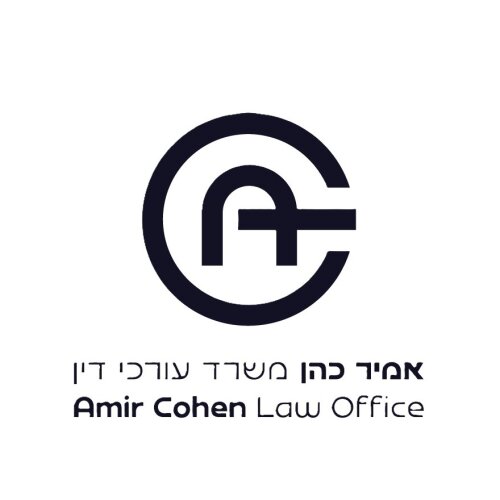Best Military Divorce Lawyers in Israel
Share your needs with us, get contacted by law firms.
Free. Takes 2 min.
Free Guide to Hiring a Family Lawyer
Or refine your search by selecting a city:
List of the best lawyers in Israel
About Military Divorce Law in Israel
Military divorce in Israel involves unique legal considerations due to the intersection of military service obligations and family law. Service members in the Israel Defense Forces (IDF) or any other military branch may face different challenges compared to civilian divorces. These challenges can include division of military pensions, spousal support, and child custody arrangements that take into account deployment schedules or military duties. Understanding both military and civilian legal frameworks is essential to navigate a military divorce successfully.
Why You May Need a Lawyer
Legal expertise is often necessary in a military divorce due to the complexity of issues involved. A lawyer knowledgeable in military divorce can assist in:
- Navigating military-specific regulations and their impact on divorce proceedings.
- Ensuring fair division of military pensions and other assets.
- Negotiating child custody and visitation schedules that accommodate military obligations.
- Understanding rights regarding spousal and child support, especially under the constraints of military pay and benefits.
- Advocating for your interests in both military and civilian legal contexts.
Local Laws Overview
Key aspects of military divorce law in Israel include:
- Jurisdiction: Divorce cases in Israel are handled by either the Rabbinical Court or the Family Court, with military status sometimes influencing which court has jurisdiction.
- Asset Division: Military pensions and benefits are subject to different rules compared to civilian assets, often requiring expert legal interpretation.
- Child Custody: Arrangements must consider the unique circumstances of deployment and military duties.
- Support Obligations: Spousal and child support determinations must factor in military salaries and benefits.
- Legal Notices: Service members may have protections concerning legal notifications, acknowledging their possible deployment or unavailability.
Frequently Asked Questions
1. Can service members get divorced while deployed?
Yes, service members can initiate divorce proceedings while deployed, but specific challenges arise regarding jurisdiction and legal representation.
2. How are military pensions divided in a divorce?
Military pensions are usually considered marital property and are subject to division, though specific rules apply depending on the length of marriage and military service.
3. What happens if a service member does not appear for divorce proceedings?
The service member’s right to be informed and participate is protected, though the court can proceed in their absence under certain conditions.
4. Are deployed service members required to pay spousal support?
Yes, if ordered by the court, spousal support obligations must be met, factoring in military pay.
5. How is custody determined if one parent is frequently deployed?
Courts consider the best interests of the child, balancing military duties with the child's needs when determining custody.
6. Can divorce proceedings affect military benefits?
Yes, divorce can impact housing allowances and other benefits, depending on service member status and court orders.
7. What legal protections are there for military members in divorce proceedings?
Protections exist under Israeli law to ensure service-related absences do not unfairly disadvantage service members in legal proceedings.
8. Can overseas assignments complicate divorce matters?
Yes, overseas assignments can complicate jurisdictional issues and the service of legal documents.
9. How do courts handle international custody cases involving military families?
Courts aim to prioritize the child's stability while considering international treaties and the parents' locations.
10. Are there special considerations for reservists during a divorce?
Reservists also face unique challenges, particularly concerning sudden deployments that can affect custody and visitation arrangements.
Additional Resources
For further assistance, consider contacting the following resources:
- Military Legal Assistance Offices - These can provide initial free legal consultation and advice specific to military circumstances.
- The Ministry of Defense - Offers guidance on statutory rights and obligations under military service.
- Family Court and Rabbinical Court - For procedural information and to understand which court will handle your case.
- National Insurance Institute - For information on how divorce may affect benefits related to family size and dependency.
Next Steps
If you need legal assistance in a military divorce, here are some steps to consider:
- Gather Documentation: Collect all relevant documents, such as marriage certificates, military service records, financial statements, and any existing legal agreements.
- Seek Legal Counsel: Contact a lawyer experienced in military divorces to understand your rights and obligations comprehensively.
- Consult Military Legal Assistance: Utilize services provided by military legal assistance offices for initial guidance.
- Prepare Financial Projections: Evaluate how divorce will impact your financial situation, considering potential support obligations and asset divisions.
- Plan for Custody and Support: Begin discussions on parenting plans and support arrangements, keeping future military commitments in mind.
Lawzana helps you find the best lawyers and law firms in Israel through a curated and pre-screened list of qualified legal professionals. Our platform offers rankings and detailed profiles of attorneys and law firms, allowing you to compare based on practice areas, including Military Divorce, experience, and client feedback.
Each profile includes a description of the firm's areas of practice, client reviews, team members and partners, year of establishment, spoken languages, office locations, contact information, social media presence, and any published articles or resources. Most firms on our platform speak English and are experienced in both local and international legal matters.
Get a quote from top-rated law firms in Israel — quickly, securely, and without unnecessary hassle.
Disclaimer:
The information provided on this page is for general informational purposes only and does not constitute legal advice. While we strive to ensure the accuracy and relevance of the content, legal information may change over time, and interpretations of the law can vary. You should always consult with a qualified legal professional for advice specific to your situation.
We disclaim all liability for actions taken or not taken based on the content of this page. If you believe any information is incorrect or outdated, please contact us, and we will review and update it where appropriate.
Browse military divorce law firms by city in Israel
Refine your search by selecting a city.















